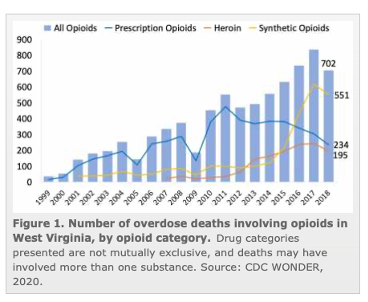
A More Serious Crisis in America’s Heartland
As a sense of dread spreads across America around the COVID-19 pandemic, the impact on those struggling with substance use disorder (SUD) is even more significant, yet relatively unacknowledged. Fear of getting the coronavirus is driving those with SUD to make decisions that put their lives at risk—not from the virus, but from a real, even more life-threatening concern: overdose.
While the country continues its 24/7 focus on COVID-19, this infection of fear, which has an impact on more than two million Americans struggling with SUD, must not be ignored.1 Prior to the pandemic, an average of 130 Americans were dying every day from opioid overdose.
Public health officials acknowledge that social isolation and the continual discussion in the media around the pandemic is a significant trigger for those struggling to stay sober. Although statistics are not yet available, there is a reasonable expectation that there will be an uptick in relapse and subsequent overdose consistent with stay-at-home orders. Health experts warn that the pandemic is aggravating the problem by forcing isolation on those in recovery, keeping them from receiving the critical support systems they need to avoid relapse.
The Appalachian Mountains, a 205-000-square-mile region stretching from southern New York state to northern Mississippi, has significantly higher numbers of opioid-related overdoses and deaths than other areas of the US.2 In 2018, West Virginia providers wrote 69.3 opioid prescriptions for every 100 persons, putting it among the top ten in the US that year. That’s compared with the average US rate of 51.4. But it was also the lowest rate since data became available in 2006.3 The state has finally seen its number of deaths come down as it has worked diligently against the opioid epidemic. The goal now is to prevent the COVID-19 pandemic from undoing all the progress they’ve made.

In response to these concerns, the state of West Virginia has taken bold steps to rapidly increase access to SUD support, both for those struggling with addiction and for the clinicians who care for them. The state has partnered with CHESS Health to provide its Connections smartphone app to SUD patients and providers to help reduce isolation and to offer support resources through the CHESS Connections to Recovery program.
The Connections app enables West Virginia providers to immediately re-engage with their patients to continue treatment and reduce the impact of isolation during the pandemic. Just as quickly as COVID-19 has spread across Appalachia, the state of West Virginia knew it needed to act just as fast to help maintain and further the progress it has already made in fighting the opioid epidemic throughout the region. The CHESS Connections to Recovery program was launched in just a few weeks and is in use by patients, peers, providers, and sponsors across the state.
It is in times of crisis such that we are in now that forces us to innovate—to think of new ways to address both new and existing problems. Nowhere has this been more needed than in healthcare. While we are making significant progress in the battle against opioids, we must not let down our guard. By implementing tools such as the CHESS Connections app, states can continue their efforts to eradicate opioid abuse and to create a healthier population—during the pandemic and beyond.
Please find more information at https://www.chess.health/connections-for-recovery-west-virginia/.
https://www.cdc.gov/injury/features/prescription-drug-overdose/index.html (1)
https://www.cnn.com/2020/05/14/health/opioids-addiction-appalachia-coronavirus-trnd/index.html (2)
